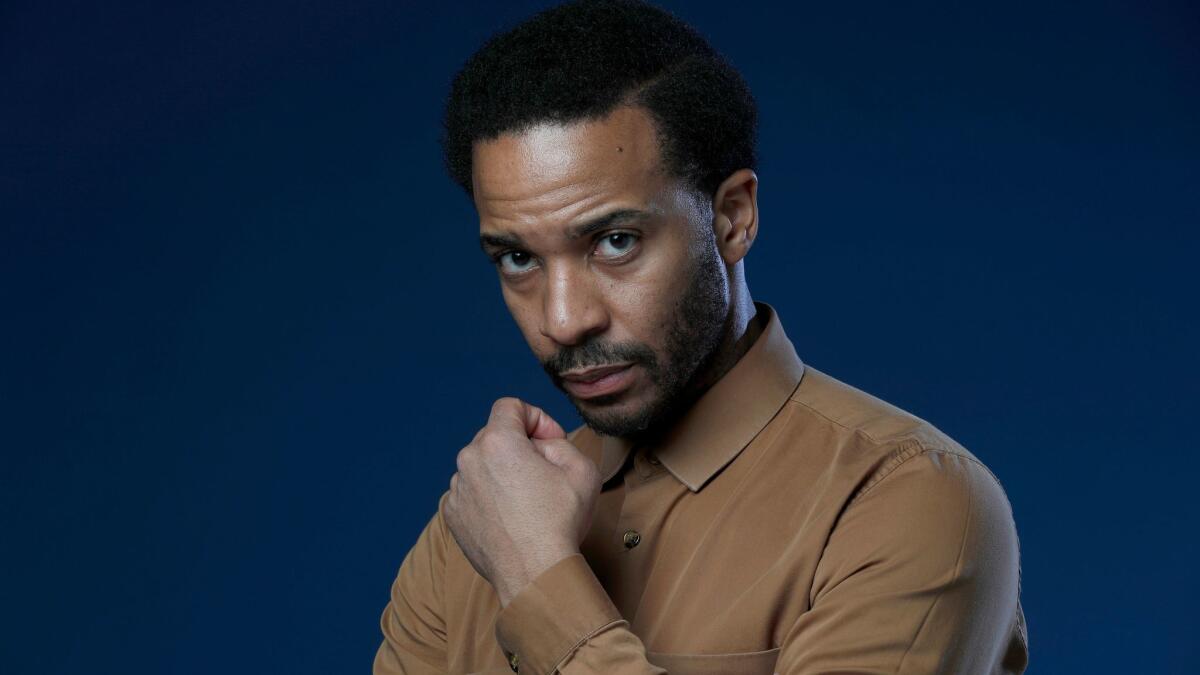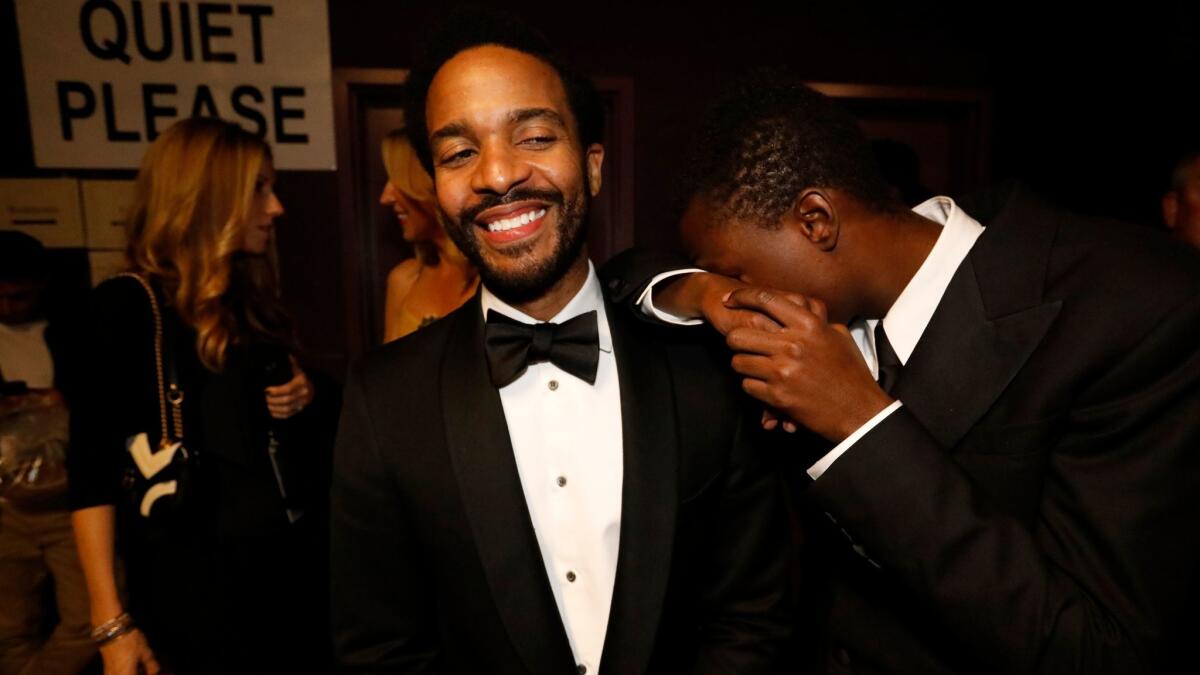André Holland talks about ‘Wrinkle,’ ‘Othello’ and the wild ‘Moonlight’ Oscar night

André Holland captured the attention of audiences (and Oscar voters) with his charismatic role as Kevin in the the third and final moving chapter of “Moonlight.” But the surprise best picture win for “Moonlight” at last year’s Academy Awards won’t be the last time Holland will be in the spotlight.
Among Holland’s slate of 2018 projects are the upcoming Stephen King-inspired Hulu series “Castle Rock” and “A Wrinkle in Time,” now in theaters, directed by Ava DuVernay whom Holland worked with on “Selma.”
The Alabama-born actor is also directing a production of the Greg Keller play “Dutch Masters,” which debuts in New York in April. And he is currently filming Steven Soderbergh’s sports drama “High Flying Bird.”
In July, the title role in “Othello” will mark Holland’s debut at Shakespeare’s Globe Theatre in London. Globe veteran Mark Rylance — whom Holland calls “one of my heroes” — is set to play Iago.
In a phone call from a bustling Manhattan rehearsal space, Holland spoke with The Times after working on his own play, on the one-year anniversary of a certain fateful awards ceremony.
What stands out most in your memory about that Oscar night?
Obviously the moment — the famous Envelope-gate moment is a memory that I don’t think I’ll ever forget. And then also just the weeks and the months leading up to it when we were all, as a cast and company, traveling around the world talking about the film. None of us could believe that it was having the impact that it had, but we sort of became a real family. We had such a good time just hanging out with each other.

Reuniting with Ava DuVernay for “A Wrinkle in Time,” how did her directing style feel going from the modestly budgeted “Selma” to a Disney movie with a $100 million-plus budget?
I would say it’s all the same. Super-consistent. I remember when we did “Selma,” it wasn’t a huge budget by any means, but she made a point of having one-on-one personal relationships with everybody. Not just with the cast but also with the crew. She knew everybody by name, made sure everybody had what they needed.
I remember there was a day when I had a cold, we were on “Selma,” and I came in, and one of the PAs noticed that I was looking a little green, just sort of said, “Do you need anything, André?” I said, “No, no, I’m fine.” I’m a theater guy, so I’m like, “The show must go on.” And then about 10 minutes later, Ava came all the way down from set, which was quite a ways away. She stopped what she was doing, knocked on my trailer door and just sat down and said, “How are you feeling, brother? What do you need?” And she — I still can’t believe she did it — but she rearranged the whole day of shooting so that I would have a little more time in the morning to rest and recuperate.
And she’s the same way on “Wrinkle in Time.” She has a very personal touch to everything she does. And I think it comes through in her work.
Your “Wrinkle” character, Mr. Jenkins, is a seemingly minor character but very connected to how Meg protects her younger brother and how she’s handling her father’s disappearance.
Yeah, the way it was written and the way we did it, you get a sense that it is an important relationship. Principal Jenkins is the last adult that she has contact with before she goes off on her journey. I tried to play him as not a stodgy old principal but as a younger principal who sees a lot of potential in her and wants the best for her. So although he’s stern, it really comes from a place of love. That’s something that Ava and I found together and that I think is really true in our community, in the black community. She and I both, when we started talking about it, we’re like, “Oh yeah” — we both had teachers like that. So that’s what we hoped to capture.
You were in “American Horror Story: Roanoke” and you have “Castle Rock” premiering on Hulu later this year — are you a fan of the horror genre?
I’m actually not a huge fan of the horror genre. It surprised me that I really reacted as well as I did [to the “Castle Rock” script] — the writing was just fantastic. I couldn’t resist. In this case, with “Castle Rock,” it didn’t really feel like horror. It felt more like a real character-driven psychological thriller, and the character that I was offered to play — number one, it was a lead character, which I had not played before.
What can you tell me about your “Castle Rock” character? Will Stephen King fans recognize him at all, or is he a totally original character?
The character is kind of a new creation. He grew up in this small town in Maine, so I think fans will like that. He moves away from the small town when he’s quite young and then works as a death row attorney in Texas, and then he gets called back to this town to investigate this sort of mysterious event that happened, and in investigating it, he uncovers all these things about his own past that he had previously locked away. Along the way he bumps into some characters who are loosely based on some Stephen King characters. So there’s a lot of Easter eggs for the fans.
When a script or an offer comes your way, how do you decide whether or not to sign onto a project?
Good writing is what attracts me. And then also stories that have something to say about what’s happening now. Not that everything has to be contemporary obviously, but that it has some impact. I have a harder time connecting with things that are fluff or pure entertainment.
Did you feel that signing onto “Othello” met that criteria of “contemporary” though it’s a play that’s over 400 years old?
The “Othello” decision was a couple of things — first, the Globe itself means a lot to me. When I was a[n undergraduate] student in London studying abroad, it was the first time I discovered that place. I love Shakespeare, and I have for a long time. While I was there, I saw Mark Rylance in “Cymbeline.” I just think he’s the greatest actor working today. So when the opportunity came along to be at the Globe and to work opposite one of my heroes, it was an easy ‘yes.’ Probably the quickest ‘yes’ my agent has ever gotten out of me.
In terms of the play itself, I was for a long time really resistant to the idea of playing Othello, because when I was growing up in the South and going to college in the South and I expressed an interests in Shakespeare, teachers or directors would always say, “Well, you must be excited to play Othello,” as if that were the only part that were available to a young, black actor. So for a long time I resisted it because I thought, “Well, no, I’m gonna go play Hamlet, just because you guys think I should only do the obvious.”
But in revisiting the play this time, this idea of perception, the way people sort of project onto other human beings who they think those human beings are regardless of who they actually are really resonated with me.
With “Moonlight,” you had a character rethinking masculinity — Kevin’s story line raises this idea of performative masculinity — how do you find yourself relating to the depictions of masculinity in “Othello”?
It’s complicated. When I read it, and you hear what’s said about [Othello] by the people around him, it seems as though he’s a figment of the white imagination in a way, that to some people he’s this sexually voracious, really strong — it’s all about his physical appearance and his body. Even when you look at the history of productions of “Othello” — at the ones that I’ve seen and researched — it seems as though he’s always played as this big strapping muscular man, and there’s always a scene where he takes his shirt off. [Laughs] I’m really interested in getting underneath the emotional life of the man and finding the humanity in him and kind of subverting what some of those images are.
Had you directed any plays before “Dutch Masters”?
No, this’ll be my first time directing. I’ve done scenes and things for young people, but I’ve never directed a full-length play. It’s also a play that deals with black masculinity and the performance thereof. So I really have been interested in the play for a long time and couldn’t pass up the opportunity to do it. I can’t say that I’ve always had a big desire to be a director, but the older I get, the more interested in that I am. Like even with [“High Flying Bird”], I’m producing it as well. Having more of a say creatively is really nice.
What’s it been like to reunite with both your “The Knick” director Steven Soderbergh and your “Moonlight” writer Tarell Alvin McCraney for “High Flying Bird”?
With Tarell, we’ve done so many plays together before. We met when we were both in graduate school. He was at Yale, and I was at NYU, and we had a teacher in common who introduced us, and we hit it off right away and just kept on, probably seven or eight productions together over the years. So in some ways it feels like a reunion for he and I, but it’s also great to get to connect he and Steven together because they’re like-minded in a lot of ways, and it’s been fun to see them work together.
What are your plans for the future?
There’s a part of me that’s interested in furthering my education. I’ve always been really intellectually curious, and so I’ve been taking some courses while in the middle of shooting things.
What kind of courses?
There’s this social justice program — I took a course in urban policy, which was really fascinating. And I took this other one that’s a history course that focuses on the Constitution. I don’t know where that’s going to lead, but I’d like to keep exploring that in 2019.
Overtime question:
What have you been reading recently?
I’ve been reading this book called “Stamped From the Beginning,” and the subtitle is “The Definitive History of Racist Ideas in America.” It’s written by this professor, Ibram Kendi. It’s just been really kind of amazing to read it, especially as I’m preparing to do “Othello.”
More to Read
Only good movies
Get the Indie Focus newsletter, Mark Olsen's weekly guide to the world of cinema.
You may occasionally receive promotional content from the Los Angeles Times.







